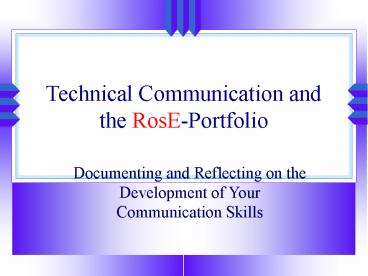Technical Communication and the RosE-Portfolio - PowerPoint PPT Presentation
Title:
Technical Communication and the RosE-Portfolio
Description:
... and Reflecting on the Development of Your Communication Skills. Technical Communication and the RosE-Portfolio. Skills of Effective Technical Communicators ... – PowerPoint PPT presentation
Number of Views:235
Avg rating:3.0/5.0
Title: Technical Communication and the RosE-Portfolio
1
Technical Communication and the RosE-Portfolio
- Documenting and Reflecting on the Development of
Your Communication Skills
2
Technical Communication and the RosE-Portfolio
- Skills of Effective Technical Communicators
- Documenting Your Development of Communication
Skills - Demonstration of the RosE-Portfolio System
- Reflecting on Your Development
- Sharing Your Work with Employers
3
Skills of Effective Technical Communicators
- 5 minute writing
- What skills do effective technical communicators
possess? - What tasks do they customarily perform when they
prepare documents? - What kinds of documents do they produce?
4
Learning Objectives for RH 330, Technical
Communication
- Familiarity with the forms of communication
appropriate to workplace communication - Ability to apply organizational patterns to
structure technical information - Ability to perform audience analysis as the basis
for planning and completing any communication task
5
Learning Objectives
- Ability to locate information and assess its
accuracy - Consistent use of proper spelling, grammar,
punctuation, and mechanics - Experience with testing audience response
- Familiarity with various technologies useful in
the completing of communication tasks
6
Institute Communication Learning Objectives
- Defined as An ability to communicate
effectively in oral, written, graphical, and
visual forms - Specified further by 5 criteria
- Identify the readers/audience for a communication
task by assessing their technical knowledge and
information needs.
7
Communication
- Organize and/or design information to meet
readers/audience needs.. - Provide content that is factually correct,
supported with evidence, explained with
sufficient detail, and properly documented.
8
Communication
- Test readers/audience response to communication
tasks to determine how well ideas have been
relayed. - Submit work with a minimum of errors in spelling,
punctuation, grammar, and usage.
9
Documenting Your Development
- Opportunities to work on developing your
communication skills Assignments, Peer Review,
Conferences, Final Report, Oral Reports - Feedback on your work
- Course Objectives Matrix
- Electronic system to store your work
- Available to prospective employers
10
Electronic Documentation Method RosE-Portfolio
11
Reflecting on Your Development
- Industry Standard Performance Review Forms
- Example from Cummins Engine
- Reflective Statement for Communication
12
What is a Reflective Statement?
- A very important element in portfolio
- Helps you assess your accomplishments at Rose
- Reflective statement makes a case or argues for
the relevance of the submitted file to a
particular learning objective
13
Questions that the RS answers
- What did I do?
- What does it mean?
- What have I learned?
- How might I do things differently?
- Why is it relevant to this objective?
14
Sample 1
- I wrote my Tech Comm report for two reader types,
a RHIT student and a professional non-expert.
The report topic is recent development in DVD
technology. It is a really good paper.
15
Sample 2
- I wrote this report on DVD technology for the
Tech Comm class. In order to plan this report, I
had to take into consideration the audience I was
writing for. I decided to address my report to
junior-level electrical engineering students who
are interested in learning more about DVD. For
these readers, I included a glossary of terms
that . . .
16
Sample 2 (continued)
- provide a basic vocabulary for DVD. I also
thought my readers would be better informed if I
included a section on the history of DVD
development. My professional non-expert reader
was accommodated in section 4, which gives a case
study analysis of DVD application in the
entertainment industry. I assumed that the
second reader would be more interested in how
changes in technology affect specific industries.
17
Sharing Your Work with Employers
- Professional Portfolios
- Your Job Search this year
- Access for Employers
- Determined and Controlled by You
18
Why is RHIT doing this?
- Quality control
- Are students achieving desired outcomes?
- How can we improve our educational process?
- Provide evidence to constituencies
- accreditation funding agencies
- recruiters, prospective students
- faculty
19
Who will be looking at your portfolio?
- You
- Your faculty advisor
- Faculty raters
- Technical support team
- Anyone else to whom you give permission (e.g.,
potential employers)
20
What will faculty raters do with the information?
- Report assessment results in aggregate
- Make recommendationsfor improving the
educational process - Give feedback to students that were rated
21
Technical Communication and the RosE-Portfolio
- Skills of Effective Technical Communicators
- Documenting Your Development of Communication
Skills - Demonstration of the RosE-Portfolio System
- Reflecting on Your Development
- Sharing Your Work with Employers































